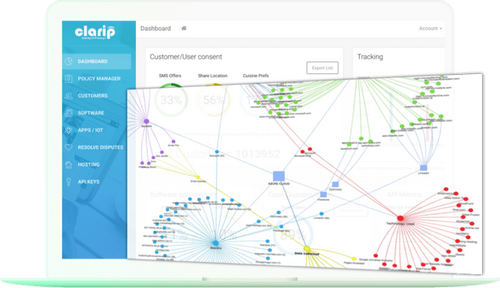Now that the General Data Protection Regulation (GDPR) is in full force, compliance with the European legislation is top of mind. Clarip wants to make that as easy as possible.
Clarip – short for “clarity in privacy”– provides a platform that uses machine learning, text analytics and data science to achieve that objective. The company uses patent-pending “hybrid artificial intelligence (AI)” to execute a number of GDPR- and privacy-related tasks, such as stopping data leaks, surfacing and understanding third-party data sharing, creating more effective privacy notices and finding new revenue opportunities.
Clarip Chief Executive Officer and Founder Andy Sambandam told me that the company was created to make sense of all the requirements that companies have.
“When you think about it over the last 10, 15 years, you have so much development in technologies and artificial intelligence and big data and mobile phones everywhere …”, Sambandam said. “Consumers are at a point where it’s really hard to understand what’s going on.”
The suite includes an enterprise-wide consent management system, data flow mapping, cookie managers, a data subject access rights portal, simplified privacy notices and more.
Simplified privacy
Sambandam said that most people do not read the terms and conditions and privacy notices.

“So, it’s very hard to understand what’s going on because nobody would have time to read those 1,000 words and extremely long legal documents”, Sambandam said. “So what we want to do is simplify it … so … end users will be better able to understand what’s going on.”
The end product is privacy policies that are easy to read and navigate.
“Our philosophy and goal is to bring in both consumers and companies together and manage data and privacy in a more transparent and meaningful manner”, Sanbandam said.
Data mapping for any page
I connected with Clarip in the wake of a European ruling that would require Facebook Page admins to act as separate controllers of the same data collected by Facebook. In other words, Facebook admins would be required to get consent for the countless cookies that are collecting retargeting data on any given page.

Close-up of Clarip’s data flow mapping feature
Sambandam reached out to me because he said that the suite’s data mapping capability can help. He said:
Today the Court of Justice of the European Union (CJEU) has made it clear that any company with a Facebook page can be liable for the tracking and data collection done directly by Facebook. This decision makes the individual businesses a joint-controller along with Facebook or any similar social media platform. In a way, the CJEU has essentially just put every company in charge of policing the privacy disclosures of their social media pages.
Given the well known privacy issues at Facebook and the likelihood of inadequate disclosures by other social media companies, businesses that are not monitoring the data collection and disclosures of these platforms are leaving themselves open to potentially massive fines. The ‘Like’ button is soon going to have a lot of dislikes in the business community.
Clarip isn’t the only suite of tools that can help businesses manage their data. But with the company’s simple approach, Sambandam says it hopes to set the standard for compliance tools to come.

